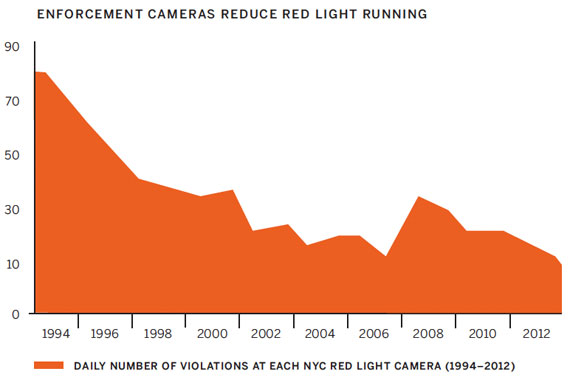
Taking up one of the contrarian slots in today's "Room for Debate" segment about Vision Zero and pedestrian safety in NYC, Jennifer Lynch of The Electronic Frontier Foundation staked out the civil libertarian position against automated traffic enforcement. EFF does great legal and policy work in general, but Lynch is way off base here. At this point, there's a mountain of evidence that traffic cameras save lives, and it's highly irresponsible to suggest, as Lynch does, that we need more data before taking action.
The de Blasio administration is seeking permission from Albany to install speed and red light cameras as the city sees fit, while Lynch argues that "New York has not shown that adding cameras to city streets and mandating private vehicle monitoring will prevent pedestrian deaths."
But research on the effect of speed cameras has been around for years. A 2010 review of 28 studies of automated speed enforcement found uniformly positive effects on motorist speed and fatality rates:
All 28 studies found a lower number of crashes in the speed camera areas after implementation of the program. In the vicinity of camera sites, the reductions ranged from 8% to 49% for all crashes, with reductions for most studies in the 14% to 25% range. For injury crashes the decrease ranged between 8% to 50% and for crashes resulting in fatalities or serious injuries the reductions were in the range of 11% to 44%. Effects over wider areas showed reductions for all crashes ranging from 9% to 35%, with most studies reporting reductions in the 11% to to 27% range. For crashes resulting in death or serious injury reductions ranged from 17% to 58%, with most studies reporting this result in the 30% to 40% reduction range. The studies of longer duration showed that these positive trends were either maintained or improved with time.
While the authors say more research is needed to isolate the size of the speed camera effect, they conclude that "the consistency of reported positive reductions in speed and crash results across all studies show that speed cameras are a worthwhile intervention for reducing the number of road traffic injuries and deaths."
If NYC implemented speed cameras citywide and achieved a 30 percent reduction in traffic deaths and serious injuries -- the low end of the typical range of improvement in these studies -- nearly 100 lives would be saved and nearly 1,000 life-altering injuries would be prevented each year.
The civil liberties argument against speed cams is bound to surface again as the de Blasio administration pursues home rule from Albany. So it's worth recalling that the city has been able to tailor its camera enforcement programs to win the blessing of the NYCLU. NYC's bus lane cameras, for instance, have to point in a certain direction and cannot store images beyond a certain time limit.
There's also the matter of selective enforcement, which cameras can eliminate. Speed cameras don't profile the person behind the wheel. All speeding motorists get treated the same.





